ADC
-
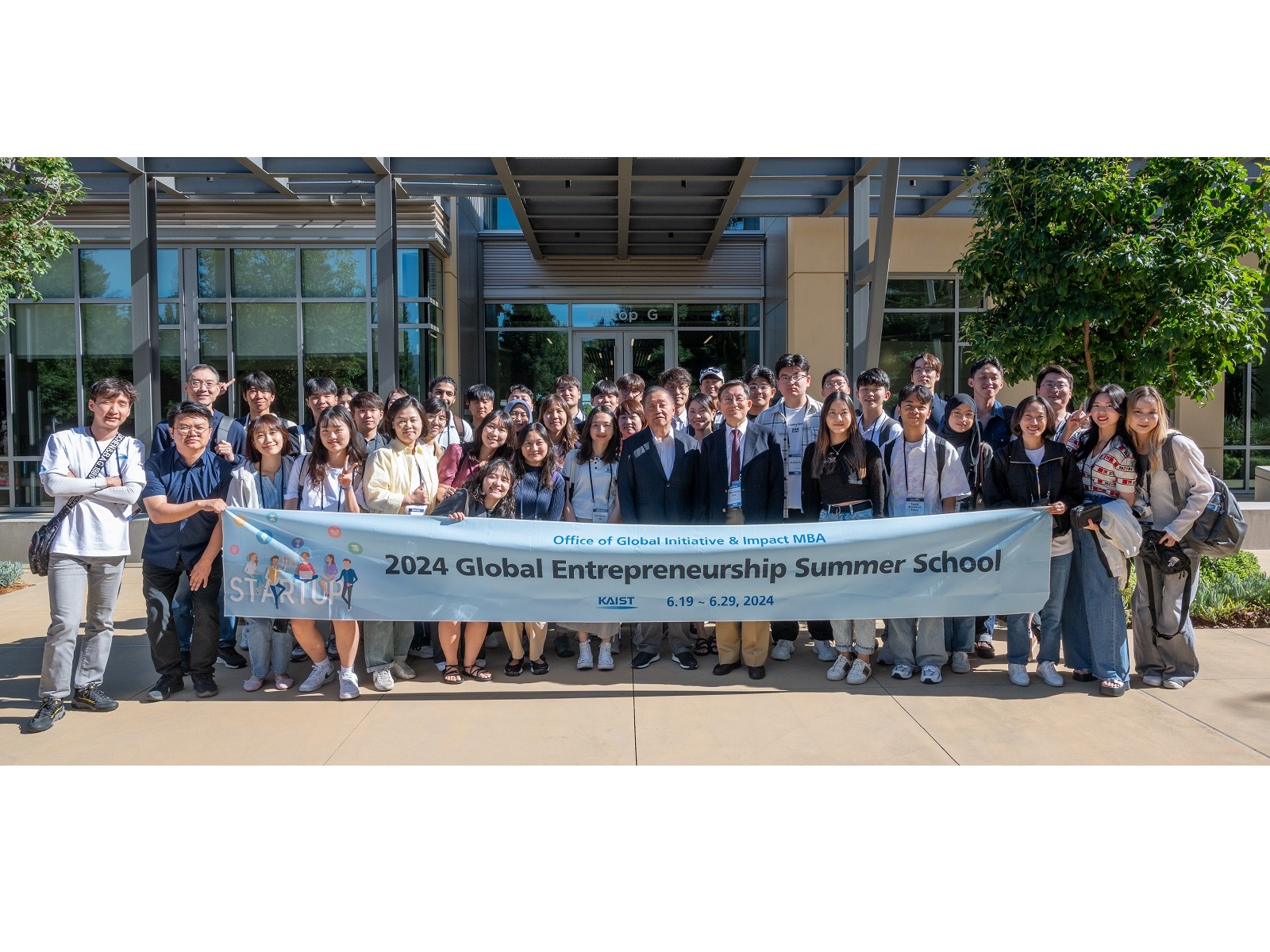 The 3rd Global Entrepreneurship Summer School (GESS 2024) Successfully Completed in Silicon Valley
The 2024 Global Entrepreneurship Summer School (2024 KAIST GESS), hosted by the Office of Global Initiatives under the KAIST International Office (Director Man-Sung Yim), was held for the third time. This program allows students to visit Silicon Valley, a global startup hub, to directly experience its famous startup ecosystem and develop their capabilities for global expansion. A total of 20 students were selected through applications, interviews, final presentations, mentoring, and peer evaluations. Additionally, 17 students from the KAIST Impact MBA course at the KAIST Business School also participated.
Before starting the Silicon Valley program, participants received mentoring on business model development and pitching advice from a senior entrepreneur at KAIST for about two months, beginning last May. Afterward, they developed business items for each team at KAIST’s main campus in Daejeon. For seven days, starting from June 23rd, workshops were held under the themes of global entrepreneurship, learning through failure, capital and network, and startup culture at KOTRA Silicon Valley Trade Center, JP Morgan, and Plug and Play Tech Center. This program's lecture series provided prospective entrepreneurs with the opportunity to systematically learn the mindset and gain the experience needed to start a global business.
The participants also visited local companies and gained experience in the field of global technology startups. Visits included Bear Robotics (CEO John Ha), Soundable Health (CEO Cathering Song), ImpriMed (CEO Sungwon Lim), Phantom AI (CEO Hyunggi Cho), B Garage (CEO Aiden Kim), and Simple Steps (CEO Doyeon Kim). Lectures contained vivid experiences from Silicon Valley CEOs and company tours boosted the students' passion for entrepreneurship. In particular, Doyeon Kim, CEO of Simple Steps, which helps prevent career breaks for Korean female immigrants in Silicon Valley and allows talented female immigrants to demonstrate their abilities in society, said, “As a KAIST alumna entrepreneur, it was meaningful to share my experience with this generation of students who dream of starting a global business and creating social enterprises in the United States.”
This program also included a tour of Silicon Valley's big tech companies that have made a significant impact on the digital ecosystem through technological advancement and innovation. This included Broadcom, which maintains a strong global presence in the semiconductor and infrastructure software technology fields. At the invitation of Chairman Hock Tan, GESS participants had the opportunity to attend his lecture and ask questions. Chairman Tan, who received an honorary doctorate in engineering from KAIST last February, emphasized that experiencing failure and giving consistent effort over a long period of time are more important than anything else in order to grow as a global entrepreneur, and that technologies influencing the global market evolve over generations.
< Photo. Group photo of GESS 2024 participants at Broadcom with Chairman Hock Tan (center) ⓒBroadcom>
As part of this program, participants conducted a volunteer program called 'Let's play with AI+ Tech' with the Sunnyvale community in Silicon Valley and Foothill College to help grow together with the community. Through this program, GESS participants cultivated the virtues of a global leader. In this volunteer activity, low-income elementary school students and parents from the Sunnyvale community participated in chatbot training led by KAIST students, providing an opportunity to work with underprivileged groups in the local community.
In the final pitching event, the highlight of the program, local venture investors from Silicon Valley were invited as judges and evaluated the pitches for each team's business items. The participating students, who developed their own business models while receiving advice through face-to-face mentoring from a professional accelerator in Silicon Valley, showcased their creative and innovative ideas, presenting themselves as future global entrepreneurs. Merey Makhmutova (BS in Civil and Environmental Engineering) from the K-Bridge team, who won the final pitch, expressed her ambition: “Even before GESS pitch day, our team kept refining the pitch deck as we attended the lectures and benefitted from the mentoring. Our intense teamwork was a significant reason why we ultimately won first prize.” She added that K-Bridge aims to win an award at the upcoming UKC Pitching Competition and expressed her gratitude for being able to participate in this program. Arseniy Kan (BS in Electrical Engineering) from the KAIST Enablers team, who took second place, said, “The 2024 KAIST GESS Program became the most unforgettable and precious opportunity of my lifetime, and I dream of using this opportunity as a stepping stone to becoming a global entrepreneur.“ Additionally, Kangster (CEO Kang Kim), who won the Impact MBA final pitching session, had the opportunity to secure a meeting with a local investment company after their GESS final pitch.
The 2024 KAIST GESS was held in cooperation with the KAIST International Office, the KAIST College of Business, and Startup KAIST. Director Man-Sung Yim from the Office of Global Initiatives, who hosted the event, said, “KAIST students will grow into leaders with global influence and contribute to the international community by creating global value. At the same time, we hope to raise the international status of our university.” Professor Sangchan Park, who led the 17 Impact MBA students in this educational program, added, “Meeting with companies leading the global market and visiting Silicon Valley has been a valuable learning experience for students aiming to start a global startup.”
KAIST plans to continue promoting its global entrepreneurship education program by enriching its curriculum each year and helping students grow into entrepreneurs with the virtues of global leaders.
2024.07.03 View 7199
The 3rd Global Entrepreneurship Summer School (GESS 2024) Successfully Completed in Silicon Valley
The 2024 Global Entrepreneurship Summer School (2024 KAIST GESS), hosted by the Office of Global Initiatives under the KAIST International Office (Director Man-Sung Yim), was held for the third time. This program allows students to visit Silicon Valley, a global startup hub, to directly experience its famous startup ecosystem and develop their capabilities for global expansion. A total of 20 students were selected through applications, interviews, final presentations, mentoring, and peer evaluations. Additionally, 17 students from the KAIST Impact MBA course at the KAIST Business School also participated.
Before starting the Silicon Valley program, participants received mentoring on business model development and pitching advice from a senior entrepreneur at KAIST for about two months, beginning last May. Afterward, they developed business items for each team at KAIST’s main campus in Daejeon. For seven days, starting from June 23rd, workshops were held under the themes of global entrepreneurship, learning through failure, capital and network, and startup culture at KOTRA Silicon Valley Trade Center, JP Morgan, and Plug and Play Tech Center. This program's lecture series provided prospective entrepreneurs with the opportunity to systematically learn the mindset and gain the experience needed to start a global business.
The participants also visited local companies and gained experience in the field of global technology startups. Visits included Bear Robotics (CEO John Ha), Soundable Health (CEO Cathering Song), ImpriMed (CEO Sungwon Lim), Phantom AI (CEO Hyunggi Cho), B Garage (CEO Aiden Kim), and Simple Steps (CEO Doyeon Kim). Lectures contained vivid experiences from Silicon Valley CEOs and company tours boosted the students' passion for entrepreneurship. In particular, Doyeon Kim, CEO of Simple Steps, which helps prevent career breaks for Korean female immigrants in Silicon Valley and allows talented female immigrants to demonstrate their abilities in society, said, “As a KAIST alumna entrepreneur, it was meaningful to share my experience with this generation of students who dream of starting a global business and creating social enterprises in the United States.”
This program also included a tour of Silicon Valley's big tech companies that have made a significant impact on the digital ecosystem through technological advancement and innovation. This included Broadcom, which maintains a strong global presence in the semiconductor and infrastructure software technology fields. At the invitation of Chairman Hock Tan, GESS participants had the opportunity to attend his lecture and ask questions. Chairman Tan, who received an honorary doctorate in engineering from KAIST last February, emphasized that experiencing failure and giving consistent effort over a long period of time are more important than anything else in order to grow as a global entrepreneur, and that technologies influencing the global market evolve over generations.
< Photo. Group photo of GESS 2024 participants at Broadcom with Chairman Hock Tan (center) ⓒBroadcom>
As part of this program, participants conducted a volunteer program called 'Let's play with AI+ Tech' with the Sunnyvale community in Silicon Valley and Foothill College to help grow together with the community. Through this program, GESS participants cultivated the virtues of a global leader. In this volunteer activity, low-income elementary school students and parents from the Sunnyvale community participated in chatbot training led by KAIST students, providing an opportunity to work with underprivileged groups in the local community.
In the final pitching event, the highlight of the program, local venture investors from Silicon Valley were invited as judges and evaluated the pitches for each team's business items. The participating students, who developed their own business models while receiving advice through face-to-face mentoring from a professional accelerator in Silicon Valley, showcased their creative and innovative ideas, presenting themselves as future global entrepreneurs. Merey Makhmutova (BS in Civil and Environmental Engineering) from the K-Bridge team, who won the final pitch, expressed her ambition: “Even before GESS pitch day, our team kept refining the pitch deck as we attended the lectures and benefitted from the mentoring. Our intense teamwork was a significant reason why we ultimately won first prize.” She added that K-Bridge aims to win an award at the upcoming UKC Pitching Competition and expressed her gratitude for being able to participate in this program. Arseniy Kan (BS in Electrical Engineering) from the KAIST Enablers team, who took second place, said, “The 2024 KAIST GESS Program became the most unforgettable and precious opportunity of my lifetime, and I dream of using this opportunity as a stepping stone to becoming a global entrepreneur.“ Additionally, Kangster (CEO Kang Kim), who won the Impact MBA final pitching session, had the opportunity to secure a meeting with a local investment company after their GESS final pitch.
The 2024 KAIST GESS was held in cooperation with the KAIST International Office, the KAIST College of Business, and Startup KAIST. Director Man-Sung Yim from the Office of Global Initiatives, who hosted the event, said, “KAIST students will grow into leaders with global influence and contribute to the international community by creating global value. At the same time, we hope to raise the international status of our university.” Professor Sangchan Park, who led the 17 Impact MBA students in this educational program, added, “Meeting with companies leading the global market and visiting Silicon Valley has been a valuable learning experience for students aiming to start a global startup.”
KAIST plans to continue promoting its global entrepreneurship education program by enriching its curriculum each year and helping students grow into entrepreneurs with the virtues of global leaders.
2024.07.03 View 7199 -
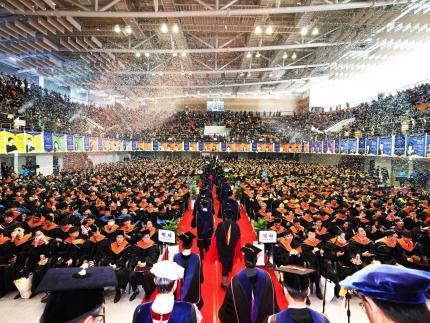 World-renowned Soprano Sumi Jo and Broadcom CEO Hock Tan awarded honorary doctorate from KAIST
< (From left) Sumi Jo, Distinguished Visiting Professor at the Graduate School of Culture and Technology, and Broadcom President and CEO Hock Tan >
KAIST (President Kwang-Hyung Lee) announced that it awarded honorary doctorates to world-renowned soprano Sumi Jo, a distinguished visiting professor at the Graduate School of Culture and Technology, and the President and Chief Executive Officer of Broadcom Inc., Hock Tan, at the graduation ceremony held on the 16th of February, 2024.
Professor Sumi Jo, who received an honorary doctorate in science and technology, was appointed as a visiting professor at KAIST Graduate School of Culture and Technology in 2021 and established the "Sumi Jo Performing Arts Research Center" and have been involved in research providing valuable feedback on projects to put on stage performances utilizing AI-orchestrated musical ensemble technology and research on virtual voices using vocal synthesis technology, as well as participating in the demonstration of the technological performance showcased at KAIST. Also, she held a special lecture and a talk concert for KAIST students, sharing her experience as a celebrated soprano on the world stage and having honest conversations with students.
KAIST said, “The doctorate is being awarded in recognition of her contributions that is broadening the spectrum of research in the field of science and technology to lead the digital era by suggesting a direction for future
science and technology to take led by culture. Also, her significant contribution to promoting necessary internationalization capabilities helps KAIST as it is growing into a world-class university through new academic challenges.”
< Professor Sumi Jo (left), who received an honorary doctorate in science and technology, and President Kwang-Hyung Lee >
Professor Sumi Jo, who debuted as Gilda in the opera in 1986, has performed with world-class conductors such as Herbert von Karajan, Georg Solti, Zubin Mehta, and James Levine. She has released over 40 full-length albums and continues to excel in all areas of vocal performances, including film scores, songs, and musicals.
Professor Sumi Jo said, “When I received a proposal from President Kwang-Hyung Lee of KAIST to convey what I experienced and felt on the world stage to students of science at KAIST under the topic of ‘Music and My Life,’ questions started to swirl inside of me.”
She continued, “Singing on stage is about ‘expressing,’ and it is a comprehensive artistic process that unfolding the artist’s inner self (expression) and showing it (presentation) in a way that the audience can best feel it through
methods such as sound, lighting, and directing. And I realized that, I was singing all my life in an environment where science and technology coexisted with culture and art.”
“When I worked with the students here at KAIST, I came to realize that when scientific and technologically talented people are set free to really enjoy their ideas and explore them on their own terms, their insight become sharper and their creativity become richer,” she said. She went on to add, “I am proud to be able to join the graduates at the ceremony and would like to express my gratitude for awarding me the honorary doctorate.”
< (From left) President Hock Tan, who received the honorary doctorate in engineering, Mrs. Lya Trung Tan, and President Kwang-Hyung Lee >
Hock Tan received an honorary doctorate in engineering. He is a highly successful businessman who demonstrated entrepreneurship based on a profound understanding of science and technology, which transformed Broadcom into a global enterprise in technology that provides semiconductor and software solutions.
Broadcom has achieved advancement and technological innovation in the semiconductor industry tailored to computer and telecommunication networks, and is evaluated as having played a major role in bringing about the digital transformation movement that is now encompassing the global communities.
Tan attributes the secret to his success to ‘the considerate decision made by the university to award him the scholarship which enabled him to pursue his degree’ and ‘the great team members working with him’..’ Also, he is well-known as a person who considers giving back to society his most important mission.
To support effective medical treatment and identification of the cause of autism, Tan has made large donations to MIT and Harvard University since 2017 several times, and during the COVID-19 pandemic, he reinforced his support to improve the treatment of workers at community medical institutions and non-profit organizations. He also founded the Broadcom Foundation, which supports science, technology, engineering, and mathematics (STEM) education programs for students in and outside the United States.
KAIST said, “We are awarding CEO Hock Tan the honorary doctorate in recognition of his contribution to KAIST’s emergence as a world-class university, as he emphasized the importance of convergence research and
internationalization of KAIST during his time serving as an overseas member of the KAIST President's Advisory Council from 2006 to 2013, while providing policy advices built on his experiences of innovations from various parts around the world.”
Tan emphasized, “KAIST has been vital to Korea’s advancement in the global economy. (KAIST) remains a source of technological innovation,” and that, “It is truly an honor to be recognized by an institution with such a distinguished record of excellence in science, engineering and research.”
President Kwang-Hyung Lee said, “Professor Sumi Jo’s exploration into the future of performing arts through science and technology helps to expand KAIST’s scope and enhance our creative capabilities, while the dedication and humane efforts Hock Tan demonstrates as he contributes to digital innovation through corporate management and engages in various social contribution activities serves as a superb example to all members of KAIST.”
He continued, “These two have lived out the values of challenge and innovation and became examples for many, and we are very pleased to welcome them as the newest members of the KAIST family. On behalf of all members of KAIST, I deliver our sincere congratulations.”
2024.02.17 View 9792
World-renowned Soprano Sumi Jo and Broadcom CEO Hock Tan awarded honorary doctorate from KAIST
< (From left) Sumi Jo, Distinguished Visiting Professor at the Graduate School of Culture and Technology, and Broadcom President and CEO Hock Tan >
KAIST (President Kwang-Hyung Lee) announced that it awarded honorary doctorates to world-renowned soprano Sumi Jo, a distinguished visiting professor at the Graduate School of Culture and Technology, and the President and Chief Executive Officer of Broadcom Inc., Hock Tan, at the graduation ceremony held on the 16th of February, 2024.
Professor Sumi Jo, who received an honorary doctorate in science and technology, was appointed as a visiting professor at KAIST Graduate School of Culture and Technology in 2021 and established the "Sumi Jo Performing Arts Research Center" and have been involved in research providing valuable feedback on projects to put on stage performances utilizing AI-orchestrated musical ensemble technology and research on virtual voices using vocal synthesis technology, as well as participating in the demonstration of the technological performance showcased at KAIST. Also, she held a special lecture and a talk concert for KAIST students, sharing her experience as a celebrated soprano on the world stage and having honest conversations with students.
KAIST said, “The doctorate is being awarded in recognition of her contributions that is broadening the spectrum of research in the field of science and technology to lead the digital era by suggesting a direction for future
science and technology to take led by culture. Also, her significant contribution to promoting necessary internationalization capabilities helps KAIST as it is growing into a world-class university through new academic challenges.”
< Professor Sumi Jo (left), who received an honorary doctorate in science and technology, and President Kwang-Hyung Lee >
Professor Sumi Jo, who debuted as Gilda in the opera in 1986, has performed with world-class conductors such as Herbert von Karajan, Georg Solti, Zubin Mehta, and James Levine. She has released over 40 full-length albums and continues to excel in all areas of vocal performances, including film scores, songs, and musicals.
Professor Sumi Jo said, “When I received a proposal from President Kwang-Hyung Lee of KAIST to convey what I experienced and felt on the world stage to students of science at KAIST under the topic of ‘Music and My Life,’ questions started to swirl inside of me.”
She continued, “Singing on stage is about ‘expressing,’ and it is a comprehensive artistic process that unfolding the artist’s inner self (expression) and showing it (presentation) in a way that the audience can best feel it through
methods such as sound, lighting, and directing. And I realized that, I was singing all my life in an environment where science and technology coexisted with culture and art.”
“When I worked with the students here at KAIST, I came to realize that when scientific and technologically talented people are set free to really enjoy their ideas and explore them on their own terms, their insight become sharper and their creativity become richer,” she said. She went on to add, “I am proud to be able to join the graduates at the ceremony and would like to express my gratitude for awarding me the honorary doctorate.”
< (From left) President Hock Tan, who received the honorary doctorate in engineering, Mrs. Lya Trung Tan, and President Kwang-Hyung Lee >
Hock Tan received an honorary doctorate in engineering. He is a highly successful businessman who demonstrated entrepreneurship based on a profound understanding of science and technology, which transformed Broadcom into a global enterprise in technology that provides semiconductor and software solutions.
Broadcom has achieved advancement and technological innovation in the semiconductor industry tailored to computer and telecommunication networks, and is evaluated as having played a major role in bringing about the digital transformation movement that is now encompassing the global communities.
Tan attributes the secret to his success to ‘the considerate decision made by the university to award him the scholarship which enabled him to pursue his degree’ and ‘the great team members working with him’..’ Also, he is well-known as a person who considers giving back to society his most important mission.
To support effective medical treatment and identification of the cause of autism, Tan has made large donations to MIT and Harvard University since 2017 several times, and during the COVID-19 pandemic, he reinforced his support to improve the treatment of workers at community medical institutions and non-profit organizations. He also founded the Broadcom Foundation, which supports science, technology, engineering, and mathematics (STEM) education programs for students in and outside the United States.
KAIST said, “We are awarding CEO Hock Tan the honorary doctorate in recognition of his contribution to KAIST’s emergence as a world-class university, as he emphasized the importance of convergence research and
internationalization of KAIST during his time serving as an overseas member of the KAIST President's Advisory Council from 2006 to 2013, while providing policy advices built on his experiences of innovations from various parts around the world.”
Tan emphasized, “KAIST has been vital to Korea’s advancement in the global economy. (KAIST) remains a source of technological innovation,” and that, “It is truly an honor to be recognized by an institution with such a distinguished record of excellence in science, engineering and research.”
President Kwang-Hyung Lee said, “Professor Sumi Jo’s exploration into the future of performing arts through science and technology helps to expand KAIST’s scope and enhance our creative capabilities, while the dedication and humane efforts Hock Tan demonstrates as he contributes to digital innovation through corporate management and engages in various social contribution activities serves as a superb example to all members of KAIST.”
He continued, “These two have lived out the values of challenge and innovation and became examples for many, and we are very pleased to welcome them as the newest members of the KAIST family. On behalf of all members of KAIST, I deliver our sincere congratulations.”
2024.02.17 View 9792 -
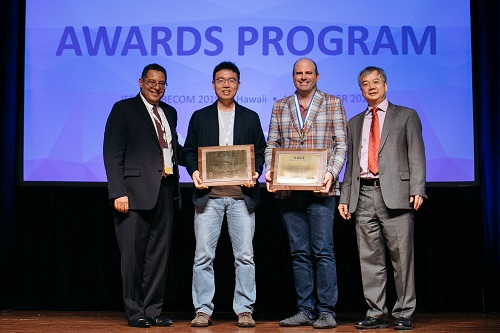 Professor Junil Choi Receives Stephen O. Rice Prize
< Professor Junil Choi (second from the left) >
Professor Junil Choi from the School of Electrical Engineering received the Stephen O. Rice Prize at the Global Communications Conference (GLOBECOM) hosted by the Institute of Electrical and Electronics Engineers (IEEE) in Hawaii on December 10, 2019.
The Stephen O. Rice Prize is awarded to only one paper of exceptional merit every year. The IEEE Communications Society evaluates all papers published in the IEEE Transactions on Communications journal within the last three years, and marks each paper by aggregating its scores on originality, the number of citations, impact, and peer evaluation.
Professor Choi won the prize for his research on one-bit analog-to-digital converters (ADCs) for multiuser massive multiple-input and multiple-output (MIMO) antenna systems published in 2016. In his paper, Professor Choi proposed a technology that can drastically reduce the power consumption of the multiuser massive MIMO antenna systems, which are the core technology for 5G and future wireless communication. Professor Choi’s paper has been cited more than 230 times in various academic journals and conference papers since its publication, and multiple follow-up studies are actively ongoing.
In 2015, Professor Choi received the IEEE Signal Processing Society Best Paper Award, an award equals to the Stephen O. Rice Prize. He was also selected as the winner of the 15th Haedong Young Engineering Researcher Award presented by the Korean Institute of Communications and Information Sciences (KICS) on December 6, 2019 for his outstanding academic achievements, including 34 international journal publications and 26 US patent registrations.
(END)
2019.12.23 View 11602
Professor Junil Choi Receives Stephen O. Rice Prize
< Professor Junil Choi (second from the left) >
Professor Junil Choi from the School of Electrical Engineering received the Stephen O. Rice Prize at the Global Communications Conference (GLOBECOM) hosted by the Institute of Electrical and Electronics Engineers (IEEE) in Hawaii on December 10, 2019.
The Stephen O. Rice Prize is awarded to only one paper of exceptional merit every year. The IEEE Communications Society evaluates all papers published in the IEEE Transactions on Communications journal within the last three years, and marks each paper by aggregating its scores on originality, the number of citations, impact, and peer evaluation.
Professor Choi won the prize for his research on one-bit analog-to-digital converters (ADCs) for multiuser massive multiple-input and multiple-output (MIMO) antenna systems published in 2016. In his paper, Professor Choi proposed a technology that can drastically reduce the power consumption of the multiuser massive MIMO antenna systems, which are the core technology for 5G and future wireless communication. Professor Choi’s paper has been cited more than 230 times in various academic journals and conference papers since its publication, and multiple follow-up studies are actively ongoing.
In 2015, Professor Choi received the IEEE Signal Processing Society Best Paper Award, an award equals to the Stephen O. Rice Prize. He was also selected as the winner of the 15th Haedong Young Engineering Researcher Award presented by the Korean Institute of Communications and Information Sciences (KICS) on December 6, 2019 for his outstanding academic achievements, including 34 international journal publications and 26 US patent registrations.
(END)
2019.12.23 View 11602 -
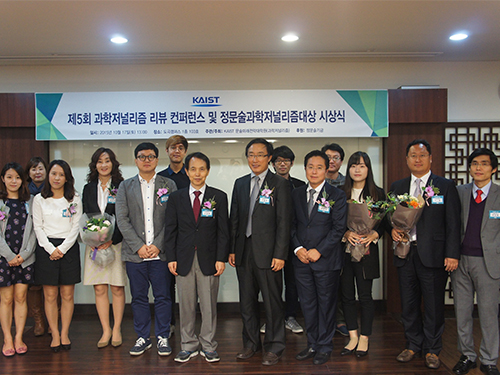 KAIST's Moon Soul Graduate School of Future Strategy Names Recipients of Science Journalism Awards
The Science Journalism Masters Program of the Moon Soul Graduate School of Future Strategy at KAIST named the winners of the 2015 Science Journalism Awards on October 17, 2015. The award ceremony took place at KAIST’s Seoul campus.
The awards were created in 2011 to recognize exemplary journalism that has contributed to the advancement of science and technology in Korea.
This year, the Korean Broadcasting System’s science show called the “Jang Yeong-Sil Show” received the Grand Prize. Yeong-Sil Jang was a Korean scientist and astronomer during the Joseon Dynasty in the 14th century.
A television documentary on challenges facing farm-raised chickens, which was produced by the Munhwa Broadcasting Corporation in Jeonju City, won the TV Award, while news coverage by Dong-A Daily on the outbreak of the Middle East respiratory Syndrome (MERS) in Korea received the Print Award.
After the award ceremony, students and professors of the Science Journalism Program hosted a conference to review and discuss major issues covered by the news media in the past year.
2015.10.15 View 7246
KAIST's Moon Soul Graduate School of Future Strategy Names Recipients of Science Journalism Awards
The Science Journalism Masters Program of the Moon Soul Graduate School of Future Strategy at KAIST named the winners of the 2015 Science Journalism Awards on October 17, 2015. The award ceremony took place at KAIST’s Seoul campus.
The awards were created in 2011 to recognize exemplary journalism that has contributed to the advancement of science and technology in Korea.
This year, the Korean Broadcasting System’s science show called the “Jang Yeong-Sil Show” received the Grand Prize. Yeong-Sil Jang was a Korean scientist and astronomer during the Joseon Dynasty in the 14th century.
A television documentary on challenges facing farm-raised chickens, which was produced by the Munhwa Broadcasting Corporation in Jeonju City, won the TV Award, while news coverage by Dong-A Daily on the outbreak of the Middle East respiratory Syndrome (MERS) in Korea received the Print Award.
After the award ceremony, students and professors of the Science Journalism Program hosted a conference to review and discuss major issues covered by the news media in the past year.
2015.10.15 View 7246 -
 Wall Climbing Quadcopter by KAIST Urban Robotics Lab
Popular Science, an American monthly magazine devoted to general readers of science and technology, published “Watch This Creepy Drone Climb A Wall” online describing a drone that can fly and climb walls on March 19, 2015. The drone is the product of research conducted by Professor Hyun Myung of the Department of Civil and Environmental Engineering at KAIST. The flying quadcopters can turn into wall-crawling robots, or vice versa, when carrying out such assignments as cleaning windows or inspecting a building’s infrastructure. Professor Myung leads the KAIST Urban Robotics Lab (http://urobot.kaist.ac.kr/). For a link to the article, see http://www.popsci.com/watch-drone-climb-wall-video.
Another Popular Science article (posted on April 3, 2015), entitled “South Korea Gets Ready for Drone-on-Drone Warfare with North Korea,” describes a combat system of drones against hostile drones. Professor Hyunchul Shim of the Aerospace Engineering Department at KAIST developed the anti-drone system. He currently heads the Unmanned System Research Group, FDCL, http://unmanned.kaist.ac.kr/) and the Center of Field Robotics for Innovation, Exploration, aNd Defense (C-FRIEND).
2015.04.07 View 12790
Wall Climbing Quadcopter by KAIST Urban Robotics Lab
Popular Science, an American monthly magazine devoted to general readers of science and technology, published “Watch This Creepy Drone Climb A Wall” online describing a drone that can fly and climb walls on March 19, 2015. The drone is the product of research conducted by Professor Hyun Myung of the Department of Civil and Environmental Engineering at KAIST. The flying quadcopters can turn into wall-crawling robots, or vice versa, when carrying out such assignments as cleaning windows or inspecting a building’s infrastructure. Professor Myung leads the KAIST Urban Robotics Lab (http://urobot.kaist.ac.kr/). For a link to the article, see http://www.popsci.com/watch-drone-climb-wall-video.
Another Popular Science article (posted on April 3, 2015), entitled “South Korea Gets Ready for Drone-on-Drone Warfare with North Korea,” describes a combat system of drones against hostile drones. Professor Hyunchul Shim of the Aerospace Engineering Department at KAIST developed the anti-drone system. He currently heads the Unmanned System Research Group, FDCL, http://unmanned.kaist.ac.kr/) and the Center of Field Robotics for Innovation, Exploration, aNd Defense (C-FRIEND).
2015.04.07 View 12790 -
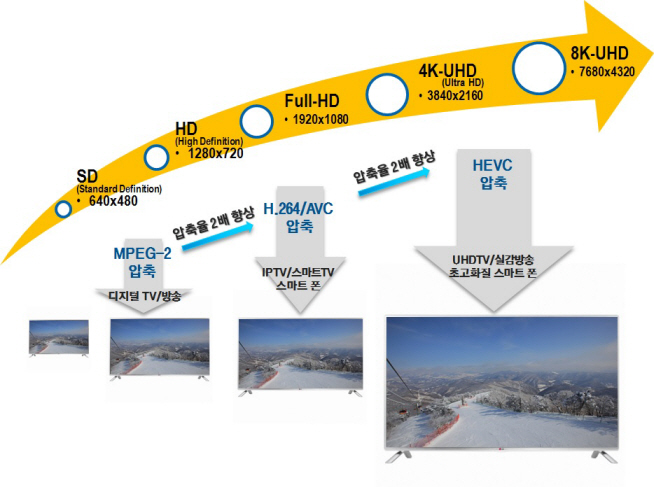 KAIST Registers an Internationally Recognized Standard Patent
A video compression technology, jointly developed by Professor Mun-Chul Kim of the Department of Electrical Engineering at KAIST, the Electronics and Telecommunications Research Institute (ETRI), and the Korean Broadcasting System (KBS), is registered internationally as the standard patent in the next-generation High Efficiency Video Coding (HEVC).
HEVC (H.265) is an international technology standard that compresses large image data for Ultra High Definition (UHD) televisions and smartphones. It has the twice the compression efficiency as that of H.264/AVC which is most commonly used for processing full HD sources. This means that it is able to compress a video file to half the size while maintaining the same image quality.
Although the related market is at a nascent stage, HEVC technology has already been applied to the latest version of televisions and smartphones. Experts predict that the market will grow to USD 200 billion by 2016, and KAIST is expected to receive a royalty payment of USD 9.3 million from this patent.
The International Organization for Standardization (ISO/IEC) established the HEVC standard in January 2013. Also, an international patent pool licensing corporation, MPEG LA announced the HEVC standard patent pool on September 29, 2014.
Professor Joongmyeon Bae, Dean of the Office of University-Industry Cooperation (OUIC) of KAIST, said, “This is an unprecedented case for Korea whereby a core technology developed by a university became an international standard, which has a vast impact on the market.”
President of KAIST, Steve Kang commented, “With its advanced technology, KAIST joined the HEVC standard patent pool as one of the 23 founding members along with Apple, Siemens, and NEC. This is a remarkable achievement.”
Picture 1: Improvements in video compression technology
Picture 2: Comparison of different screen resolutions
2014.10.09 View 13269
KAIST Registers an Internationally Recognized Standard Patent
A video compression technology, jointly developed by Professor Mun-Chul Kim of the Department of Electrical Engineering at KAIST, the Electronics and Telecommunications Research Institute (ETRI), and the Korean Broadcasting System (KBS), is registered internationally as the standard patent in the next-generation High Efficiency Video Coding (HEVC).
HEVC (H.265) is an international technology standard that compresses large image data for Ultra High Definition (UHD) televisions and smartphones. It has the twice the compression efficiency as that of H.264/AVC which is most commonly used for processing full HD sources. This means that it is able to compress a video file to half the size while maintaining the same image quality.
Although the related market is at a nascent stage, HEVC technology has already been applied to the latest version of televisions and smartphones. Experts predict that the market will grow to USD 200 billion by 2016, and KAIST is expected to receive a royalty payment of USD 9.3 million from this patent.
The International Organization for Standardization (ISO/IEC) established the HEVC standard in January 2013. Also, an international patent pool licensing corporation, MPEG LA announced the HEVC standard patent pool on September 29, 2014.
Professor Joongmyeon Bae, Dean of the Office of University-Industry Cooperation (OUIC) of KAIST, said, “This is an unprecedented case for Korea whereby a core technology developed by a university became an international standard, which has a vast impact on the market.”
President of KAIST, Steve Kang commented, “With its advanced technology, KAIST joined the HEVC standard patent pool as one of the 23 founding members along with Apple, Siemens, and NEC. This is a remarkable achievement.”
Picture 1: Improvements in video compression technology
Picture 2: Comparison of different screen resolutions
2014.10.09 View 13269 -
 KAIST Co-owns the HEVC Patent Portfolio License
MPEG LA, LLC, a firm based in Denver, Colorado, which licenses patent pools covering essential patents required for the use of video coding technology, such as MPEG-2, MPEG-4 Visual (Part 2), and HEVC/H.264, announced the availability of the High Efficiency Video Coding (HEVC) Patent Portfolio License on September 29, 2014.
The HEVC standard, also known as H.265 and MPEG-H Part 2, is necessary to improve video coding and transmission efficiency for the Internet, televisions, and mobile gadgets with increased speed and capacity.
Through the portfolio license, users can easily obtain patent rights required for the HEVC standard in a single transaction, instead of negotiating separate licenses from multiple patent holders.
A total of 23 enterprises currently own essential HEVC patents. KAIST is the only Korean university among the joint patent owners. Collaborating with the Korea Broadcasting System (KBS) and the Electronics and Telecommunications Research Institute (ETRI), Professor Mun-Chul Kim of the Electrical Engineering Department at KAIST developed one of the core patents.
For a link to a press release distributed by MPEG LA, LLC, please see:
MPEG LA, LLC, September 29, 2014
"MPEG LA, LLC Offers HEVC Patent Portfolio License"
http://www.mpegla.com/main/Pages/Media.aspx
2014.10.02 View 13628
KAIST Co-owns the HEVC Patent Portfolio License
MPEG LA, LLC, a firm based in Denver, Colorado, which licenses patent pools covering essential patents required for the use of video coding technology, such as MPEG-2, MPEG-4 Visual (Part 2), and HEVC/H.264, announced the availability of the High Efficiency Video Coding (HEVC) Patent Portfolio License on September 29, 2014.
The HEVC standard, also known as H.265 and MPEG-H Part 2, is necessary to improve video coding and transmission efficiency for the Internet, televisions, and mobile gadgets with increased speed and capacity.
Through the portfolio license, users can easily obtain patent rights required for the HEVC standard in a single transaction, instead of negotiating separate licenses from multiple patent holders.
A total of 23 enterprises currently own essential HEVC patents. KAIST is the only Korean university among the joint patent owners. Collaborating with the Korea Broadcasting System (KBS) and the Electronics and Telecommunications Research Institute (ETRI), Professor Mun-Chul Kim of the Electrical Engineering Department at KAIST developed one of the core patents.
For a link to a press release distributed by MPEG LA, LLC, please see:
MPEG LA, LLC, September 29, 2014
"MPEG LA, LLC Offers HEVC Patent Portfolio License"
http://www.mpegla.com/main/Pages/Media.aspx
2014.10.02 View 13628 -
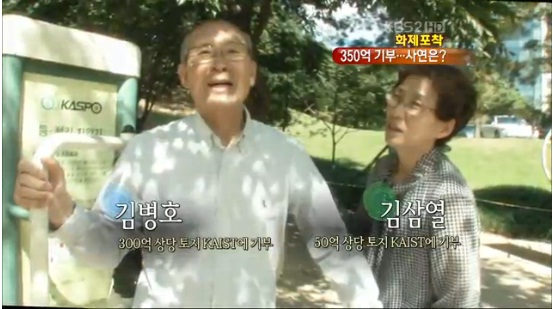 A frugal couple donates life savings of '35billion Korean Won' to KAIST.
Chairman Kim Byoung Ho and Mrs. Kim Sang Yeol have been the center of attention with various news articles and columns detailing their generous donation of real estate to KAIST, which amounted to 35billion Korean Won in value in total. Korean Broadcasting System (KBS) broadcasted a story on Chairman Byoung Ho and Mrs. Kim Sang Yeol on the 22nd of September. The broadcast link: http://news.kbs.co.kr/society/2011/09/22/2360159.html
Yahoo News also posted their donation on September 21, 2011. News link: http://ph.news.yahoo.com/frugal-woman-donates-4-3m-science-041003479.html
2011.09.27 View 9759
A frugal couple donates life savings of '35billion Korean Won' to KAIST.
Chairman Kim Byoung Ho and Mrs. Kim Sang Yeol have been the center of attention with various news articles and columns detailing their generous donation of real estate to KAIST, which amounted to 35billion Korean Won in value in total. Korean Broadcasting System (KBS) broadcasted a story on Chairman Byoung Ho and Mrs. Kim Sang Yeol on the 22nd of September. The broadcast link: http://news.kbs.co.kr/society/2011/09/22/2360159.html
Yahoo News also posted their donation on September 21, 2011. News link: http://ph.news.yahoo.com/frugal-woman-donates-4-3m-science-041003479.html
2011.09.27 View 9759 -
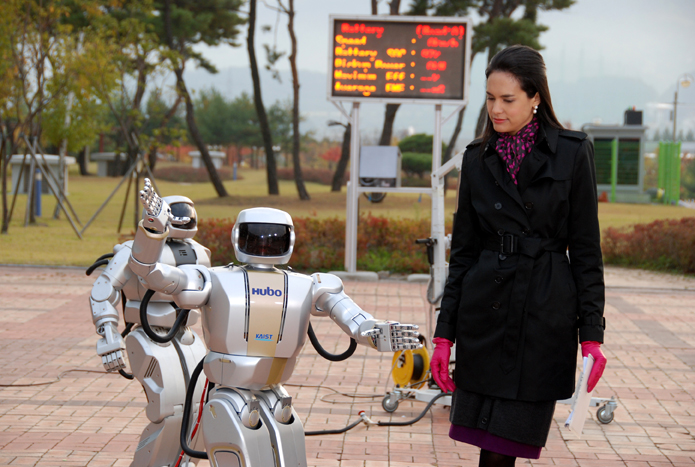 National Green Growth Project, Online Electric Vehicle, Showcased on CNN
KAIST"s green growth technologies were broadcast live on U.S. cable news network CNN from 8 a.m. to 9:30 a.m. Oct. 21.
The program was part of CNN"s week-long series, titled "Eye on South Korea," focusing on how Korea is working to become a brand leader on an international scale and how the nation is recovering from the global economic recession.
During the broadcast, award-winning CNN anchor and correspondent Kristie Lu Stout interviewed KAIST President Nam-Pyo Suh to hear about KAIST-developed two green-growth projects, On-Line Electric Car and Mobile Harbor. KAIST"s humanoid robot Hubo was also showcased.
Live broadcasts of "Eye on South Korea" aired from Oct. 21 through 23.
2009.10.21 View 14696
National Green Growth Project, Online Electric Vehicle, Showcased on CNN
KAIST"s green growth technologies were broadcast live on U.S. cable news network CNN from 8 a.m. to 9:30 a.m. Oct. 21.
The program was part of CNN"s week-long series, titled "Eye on South Korea," focusing on how Korea is working to become a brand leader on an international scale and how the nation is recovering from the global economic recession.
During the broadcast, award-winning CNN anchor and correspondent Kristie Lu Stout interviewed KAIST President Nam-Pyo Suh to hear about KAIST-developed two green-growth projects, On-Line Electric Car and Mobile Harbor. KAIST"s humanoid robot Hubo was also showcased.
Live broadcasts of "Eye on South Korea" aired from Oct. 21 through 23.
2009.10.21 View 14696 -
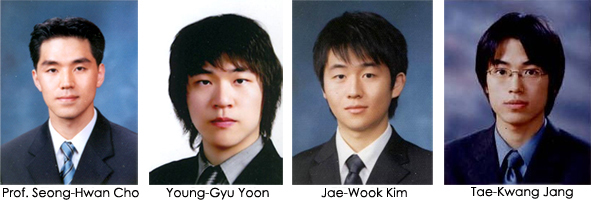 Prof. Cho's Team Awarded Best Paper Prize by IEEE
A team led by Prof. Seong-Hwan Cho of the School of Electrical Engineering and Computer Science, KAIST, won the 2009 Guillemin-Cauer Best Paper Award for their paper published in the IEEE Transactions on Circuits and Systems Journal last May, university authorities said on Thursday (June 4).
The team"s paper was entitled "A Time-based Bandpass ADC Using Time-Interleaved Voltage-Controlled Oscillators." The prize is given to a paper regarded as the best among about 350 papers published in the prestigious journal in the circuit theory area. Co-recipients of the award are Young-Gyu Yoon, Jae-Wook Kim and Tae-Kwang Jang. The award was presented at the annual 2009 International Symposium for Circuits and Systems in Taipei, Taiwan, on May 26.
The Institute of Electrical and Electronics Engineers or IEEE is an international non-profit, professional organization for the advancement of technology related to electricity. The New York-based organization has more than 365,000 members in about 150 countries making it the largest technical professional organization in the world.
2009.06.05 View 14704
Prof. Cho's Team Awarded Best Paper Prize by IEEE
A team led by Prof. Seong-Hwan Cho of the School of Electrical Engineering and Computer Science, KAIST, won the 2009 Guillemin-Cauer Best Paper Award for their paper published in the IEEE Transactions on Circuits and Systems Journal last May, university authorities said on Thursday (June 4).
The team"s paper was entitled "A Time-based Bandpass ADC Using Time-Interleaved Voltage-Controlled Oscillators." The prize is given to a paper regarded as the best among about 350 papers published in the prestigious journal in the circuit theory area. Co-recipients of the award are Young-Gyu Yoon, Jae-Wook Kim and Tae-Kwang Jang. The award was presented at the annual 2009 International Symposium for Circuits and Systems in Taipei, Taiwan, on May 26.
The Institute of Electrical and Electronics Engineers or IEEE is an international non-profit, professional organization for the advancement of technology related to electricity. The New York-based organization has more than 365,000 members in about 150 countries making it the largest technical professional organization in the world.
2009.06.05 View 14704